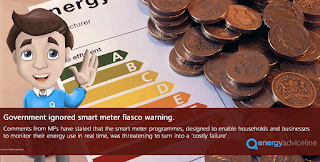Monday, 8 June 2015
Government Ignored Smart Meter Fiasco Warning
The Government should have heeded warnings to postpone the planned rollout of smart meters or risk a fiasco, according to the Energy Advice Line.
The comment follows comments by MPs that the smart meter programme, designed to enable households and businesses to monitor their energy use in real time, was threatening to turn into “a costly failure”.
Julian Morgan, managing director of the price comparison, switching and advice service for energy users, said consumer groups had warned the government some time ago that smart meters had not been sufficiently thought through.
Although they had the potential to save domestic and business consumers money and give them greater control over their energy bills, there had long been signs the rollout was not going well, Mr Morgan said.
Tim Yeo, chair of the House of Commons energy and climate committee, warned this week that time was running out to install smart meters in each of the UK’s 30m homes and businesses by 2020 as planned, following a series of technical and other delays.
“The Government has already delayed the rollout of smart meters and now it seems the rollout might happen even later,” Mr Morgan said. “As a result consumers miss out on much-needed savings on their energy bills until who knows when.
“The meters provide consumers with all the information they need to reduce their energy consumption accordingly, as well as ending the system of unreliable estimated bills.
“But unfortunately, it looks like householders and business owners, who are really struggling to pay ever-rising energy bills, will not have the opportunity to reap those savings as soon as they might.”
One key delay has been an argument between energy companies and the government about how much of the £200 cost of each smart meter installation should be added to consumer bills.
For energy companies, the meters are attractive because they remove the need for meter readers to visit peoples’ homes, and they supply detailed data on customer consumption, which can be used to tailor tariffs or for other purposes.
Mr Morgan said it remained essential for domestic and business consumers to continue to provide energy suppliers with regular and accurate meter readings to ensure they were not paying more than they needed to for their supply.
“It is also crucially important that consumers continue to shop around for the best deals, just like they would for other goods and services that they use,” Mr Morgan said.
“Most people are astonished to discover how much they can save simply by using a service like ours and comparing energy prices for the best deals.
“By staying with the same supplier year after year, you could end up paying a lot more than you need to because other suppliers want your business and are prepared to offer competitive deals to win you over.”
The Energy Advice Line is a consumer champion and an independent price comparison and switching service for householders and small and medium-sized businesses. The service enables consumers to quickly and simply compare electricity and gas prices, and to switch to the best available deal on the market.
The service also offers free advice and a contract management service, including alerts to remind business consumers users when their fixed-term energy contracts are about to end.
For further information, visit www.energyadviceline.org.uk

